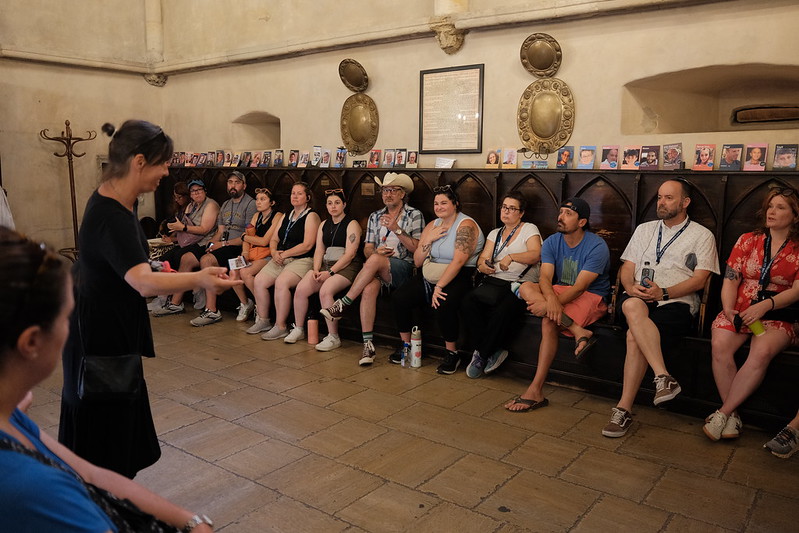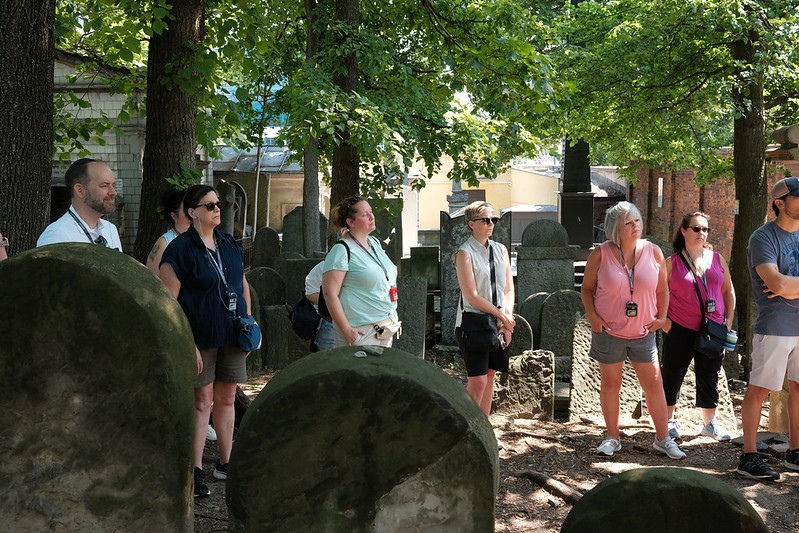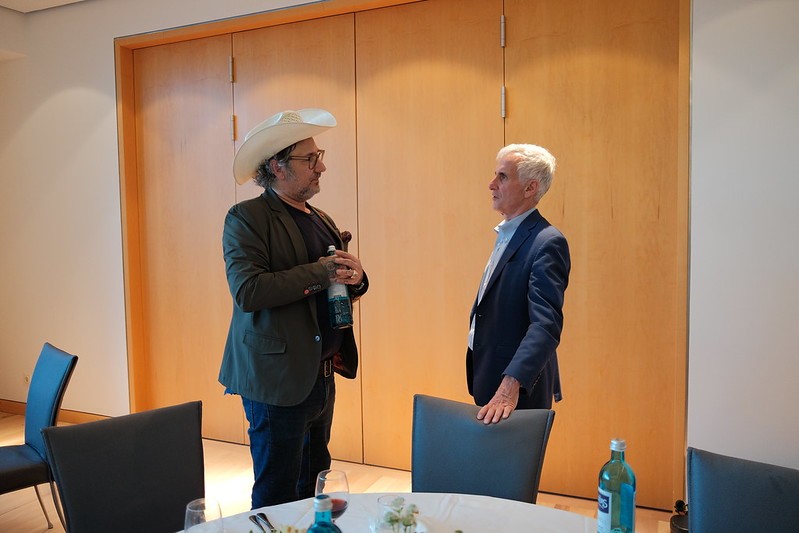A few years ago, Laura Zelle was seeking out Holocaust education trips to Europe for Minnesota K-12 teachers when she realized that there weren’t many options.
“This wasn’t being offered very much, especially to teachers in the Midwest,” said Zelle, the now-former director of Holocaust education for the Jewish Community Relations Council of Minnesota and the Dakotas.
“There was really a need for an experiential, professional development opportunity, rooted in factual history – and what is better than taking people to the place where this occurred?” she said.
So Zelle decided the JCRC should do its own Europe trip.
Through the early years of the COVID-19 pandemic, the JCRC workshopped the idea together with Kristin Thompson – who runs Humanus Network, a Holocaust education consulting organization – and in 2023 launched “The Power of Place,” a European summer institute for Holocaust educators.
The successful pilot trip took a group of 18 teachers from across the Midwest (and other parts of the country) to cities and sites like Nuremberg; the Dachau and Auschwitz-Birkenau concentration and death camps; Krakow; and Oslo.
This year’s trip, cementing The Power of Place as a staple of the JCRC’s Holocaust education offerings, brought 16 teachers to sites like the Treblinka death camp; a rural Polish town to learn about the Holocaust by Bullets; Berlin; and Prague.
(Editor’s note: This reporter was invited to join the 2024 Power of Place trip to photograph and report on the teacher’s experiences.)
This is “how we support teachers in this region, right…they can come and learn every week with us about contemporary antisemitism, they can come to other programs with us, and join us in Europe,” Zelle said. “We do have teachers that have multiple touch points with us, because [the JCRC is] this unique agency in Minnesota.”
But putting on a two-week intensive educational tour in Europe is no small feat – and not an inexpensive one, either. So the JCRC tapped three prominent donors to their Holocaust education work: The Tankenoff family, the Minnesota Vikings, and the German insurance company Allianz.
Through meetings set up by the JCRC, TC Jewfolk was given the opportunity to interview all three donors about why they support Holocaust education, both locally in the Twin Cities and with this new Power of Place trip.
‘Trying to get people to have all their senses at work’
Gary Tankenoff, who passed away in 2023, spent his life devoted to Jewish education in non-Jewish communities. He was from St. Paul, but grew up during the time of WWII and the Holocaust in small-town Bloomer, Wisc.
“It was a town that didn’t have any Jewish people,” said Gary’s son, Scott. “My dad lived there and experienced some antisemitism, but also experienced just a lot of people that didn’t understand anything about Judaism.”
The lesson Gary took away from his time in Bloomer was that non-Jews needed more education about the Jewish community, antisemitism, and of course, the Holocaust.
As a result, Gary and the Tankenoff family became prominent donors to the JCRC’s Holocaust education work – though Gary always preferred to keep a low profile, and likely “wouldn’t have wanted his name in print,” Scott said. “It’s just not his way.”

Teachers sit and listen to a guide in the Old-New Synagogue in Prague, which dates to 1270 and is said to have the remains of the infamous Golem of Prague in its attic (Lev Gringauz/TC Jewfolk)
Gary was instrumental in the creation of “Witnesses to the Holocaust,” a book published by the JCRC that includes local testimonials of Holocaust survivors and American Jewish soldiers who fought against the Nazis. The book is free for teachers (as is a classroom set of 26 books) because of support from the Tankenoff family.
A big focus for the family has been supporting Holocaust education programs that meet the changing needs of new generations. That means addressing everything from the social media-infused lives of today’s kids, to the fact that Holocaust survivors are dying out, and soon there will be no one alive who can directly tell about the Nazi attempt to eradicate world Jewry.
The Holocaust can seem to students “like it’s in a black-and-white history book,” Scott said. To make people connect personally to the Holocaust requires “a very different playbook, and content is different. It has to be.”
That’s where “The Power of Place” trip comes in. Students may not hear directly from a Holocaust survivor, but they can hear directly from their own teachers about their personal experience of visiting Holocaust sites.
After Gary’s death, as the family was discussing how to honor his legacy, supporting “The Power of Place” felt like the right move, Scott said. The trip aligns with Gary’s lifelong focus: That Holocaust education be geared toward non-Jews.
In supporting the JCRC’s work, the Tankenoff family also seems to be bucking a trend the Jewish nonprofit world has long worried about: That the next generation of Jews are not interested in supporting specifically Jewish causes like Holocaust education.
“I’ve been hearing since I was in my 20s, that generationally, Jewish philanthropy is collapsing…there’s truth to it,” Scott said. “But I also think it’s about what you believe in and what you care about, and where you want to put your emphasis..for us, as we talk about things with our kids, what we try to talk about is what those before us believed in, and we try to see how they can relate to it.”
In the wake of Oct. 7, when the terror group Hamas brutally attacked southern Israel, Scott has felt a new awareness of the horrors of the Holocaust, the need to educate about it, and the importance of Jewish identity today. He sees his kids grappling with the same issues.
But it’s up to them to decide their own philanthropic priorities, he said.
“We’re not mandating that it has to go a certain way,” Scott said. “We choose to be Jewish – if we’re going to be Jewish, we’re not doing it out of guilt, shame, or obligation. I don’t know if it’s right, but it’s what’s right for us.”
Vikings in the community
The Minnesota Vikings have a unique connection to the Holocaust: Co-owners Mark and Zygi Wilf are sons of Holocaust survivors from Poland.
Their father, Joseph, was deported with his family to a Siberian work camp by the Soviet Union (then occupying part of Poland), and as a result escaped the Nazi invasion of Eastern Europe in 1941. But Joseph’s sister, Bella, died in the Warsaw Ghetto.
Mark and Zygi’s mother, Elizabeth, survived the Lviv Ghetto and spent several years hiding in plain sight as an Aryan woman.
That history has been a call to action for the family: The Wilfs have taken a strong stance on community engagement, philanthropy, and social justice work through the Vikings.
“From ownership’s perspective, we really want to be a model in the community,” Mark Wilf told TC Jewfolk in 2019. “The Vikings are about teamwork and giving back.”
One of the ways the Wilfs do this is by donating money to a social justice committee run by the Viking players. Each year, the players on the committee decide how to allocate the funding. The committee has given over $6.5 million to various causes since 2018, including to the JCRC’s Holocaust education work.

Teachers stand in the over 200-year-old Warsaw Jewish cemetery, which the Nazis also turned into a mass execution and burial site for Jews from the Warsaw Ghetto (Lev Gringauz/TC Jewfolk)
Giving to the JCRC is “rooted in our players wanting to better educate youth and provide these opportunities to kids in Minnesota, to better understand Holocaust and genocide education, to ensure that we aren’t repeating the mistakes of our past,” said Brett Taber, the Vikings vice president of social impact.
The funding has helped the JCRC create curriculum packets; bring groups ranging from students to players to soldiers to the United States Holocaust Memorial Museum in Washington, D.C.; and now take teachers to Europe on the Power of Place trip.
“I think the unique thing that the JCRC has provided, and what we saw from last year, this trip, is how powerful and impactful this can be to these educators,” Taber said.
“Being able to bring this testimonial and bring these experiences back to Minnesota is something that is lost upon this generation, because we don’t have those firsthand experiences anymore…from people that were coming back from the war, that had relatives that experienced this firsthand.”
For the JCRC, partnering with an organization as prominent as the Vikings is an important boost to Holocaust education here, especially with the team’s natural standing in the Minnesota community.
“We’re in a unique situation, right? What we do at the JCRC, certainly not every NFL or every sports team has that same value system” that leads them to support Holocaust education, said Susie Greenberg, the JCRC’s new director of Holocaust education. “It really is an organic connection…[and the ongoing relationship is] a really honest testament to how [well] this has worked.”
The Vikings’ involvement in this work is also a point of pride to Jewish team members (like Greg Joseph, now with the Green Bay Packers) and employees.
“I’m so grateful to work for an organization that values Holocaust education and antisemitism education,” said Emily Weinberg, the Vikings youth and high school football coordinator. “Truthfully, it’s just incredible to be able to work for a place that values all of the same values that I was raised with.”
Facing the Nazi corporate past
Today, Allianz, headquartered in Munich, is the largest private insurance company in Germany – a position it also held under the Nazis.
But the company’s activities during the Nazi period, for years, were largely ignored.
“It’s in line with the experience of German companies over the years after the Second World War,” said Christopher Worthley, vice president and executive director of the Allianz Foundation for North America. “The first generation was very focused on rebuilding, and didn’t really want to talk about the past that much. Second generation was a bit similar.”
But the 1990s was a wake-up call. After the fall of Communism came a new wave of scrutiny about how victims of the Holocaust had their assets stolen, including by insurance companies that never paid out claims to Jewish clients.
A class action lawsuit against European insurance companies filed by Holocaust survivors in the U.S. left Allianz with no choice: It was time to face its demons and uncover how, exactly, the company had operated at the time of the Nazis.
Worthley was a spokesperson for Allianz at the time, and found himself front-and-center to the company’s reckoning.
“The hearings I attended at the time in the U.S. were not general discussions about distant facts,” Worthley said in a 2004 talk about Allianz. “They involved actual flesh- and-blood [Holocaust] survivors yelling at me, me personally, that my company – that I – had done nothing for fifty years to right these wrongs.”
Allianz brought in an independent researcher to write a comprehensive history of the company in Nazi Germany. Among the details dug up: A director of Allianz was Hitler’s minister of economics in 1933; the company had close ties with the SS and insured forced-labor factories in concentration camps like Dachau and Auschwitz-Birkenau; and Allianz had collaborated with Nazi authorities to reduce, as much as possible, insurance claims paid out to Jews as a result of Kristallnacht, the 1938 Nazi pogrom.
By the early 2000s, Allianz was navigating a complex restitution framework to pay back Holocaust survivors, Worthley had left Allianz to study at a seminary and then returned to head up the Allianz Foundation for North America, and there was a new push for Allianz to use its history as a launching pad for positive action.

Peter Lefkin (right), Allianz senior vice president, speaks with Adam Levy (left), a teacher in St. Paul at a dinner Allianz organized for the Power of Place trip participants (Lev Gringauz/TC Jewfolk)
“Among other things, the idea of supporting programs for Holocaust education and combating antisemitism was obviously high on the list,” Worthley said. And through a personal connection between Jewish Allianz senior vice president Peter Lefkin and JCRC executive director Steve Hunegs, Allianz started to support the JCRC’s Holocaust education work – alongside other programs working on German-Jewish relations.
“Not only is it good for Allianz, but so many of our employees want us to participate in things that are building up the local community, not only on issues with a Jewish identity but other matters in the Twin Cities,” Lefkin said.
Lefkin and Worthley hosted a dinner in Berlin for the Power of Place teachers this year – equally a welcome rest for the group, and an opportunity for the funders and funding recipients to meet and appreciate each other’s work.
“It’s become clear in the discussions with the teachers here tonight, that you can’t underestimate what an experience like [the Power of Place] means for their teaching,” Worthley said.
“The direct personal exposure – not only to their colleagues who are teaching similar material but at the sites that they’re visiting that are absolutely full of meaning from history,” he said. “It brings [Holocaust history] to life for them in a way that I think enables them to bring it to life for their students – which is incredibly important, and only more so at the moment because we’re seeing an astonishing rise in antisemitic acts.”
As a funder of the JCRC’s work, “it’s really meaningful when you see the fruits of something you’re trying to do, and you see that it’s working,” Worthley said.




















We now have immigrants coming from many Middle East and African Muslim countries who have been constantly indoctrinated to hate Jews. Teaching them about the holocaust is ineffective. We need to learn about the Quran and how it’s used against us so we can neutralize their rhetoric.
I would add that we could include parts of the Quran that at least hint at not hating the People of the Book, i.e., Jews and Christians. I don’t see how to avoid that in this day and age with what’s happening here and elsewhere. It is quite clear that there are monstrous indoctrination efforts and acts as indicated in the above reply. But there are also Muslims, including students I’ve had at Metro State and come into contact with via a Somali NGO, that I believe when they say the hatred isn’t part of the Quran. I want to advocate bringing about meetings and projects where we can learn to understand and at least tolerate each other. I think of projects in Israel, including Sindyanna and Hand-in-Hand schools, that are working against odds to do this and do have successes. I believe we should all work to enlarge their admittedly small successes. I fear for the continued existence of Israel and, indeed, for all of us if we do not work harder to stop the fights and terrorism in other ways. It seems clear to me that the past and current efforts are not working and we are all in danger. We’ve seen expressed from Jews that the killing of Muslims and destroying of their homes and livelihoods is not acceptable, just as we validly and firmly want the hatred of Muslims and Jews against us to be contained and stopped.